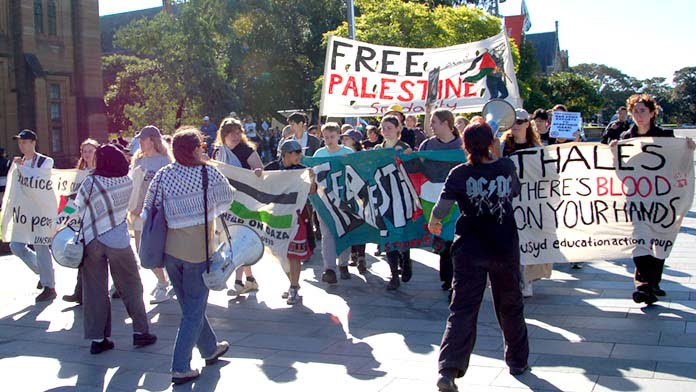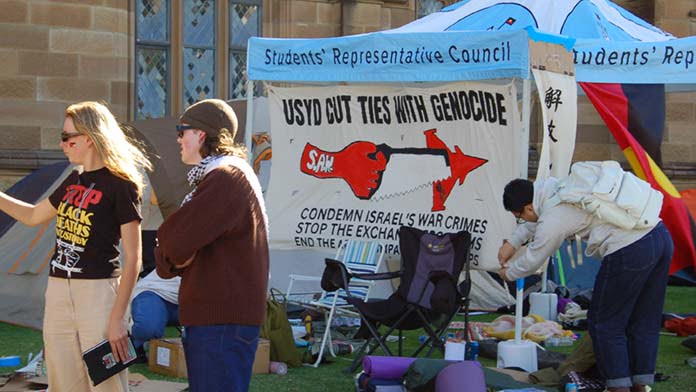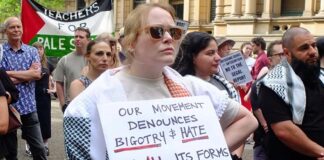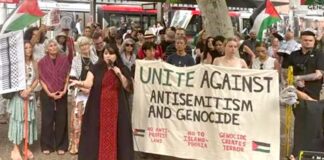Gaza solidarity encampments have spread to university campuses in Melbourne, Sydney, Canberra and Brisbane, inspired by the movement on university campuses in the US and the camp at Columbia University.
At Sydney University the camp has already lasted a week. “The encampment was set up last Tuesday night,” Angus Dermody, a student activist, told Solidarity. “There was an organising meeting and from that, tents were set up on the Quad lawns.
“On the first night we had around 30 to 40 sleeping here.”
The students are demanding Sydney University cut ties with weapons manufacturers and cut ties with Israeli universities, as well as calling on NSW Premier Chris Minns to drop charges against pro-Palestine protesters and scrap the anti-protest laws.
Sydney Uni has partnerships with weapons companies including Safran, Thales and Lockheed Martin, which all produce weapons Israel is using in its genocide in Gaza.
It also continues to maintain exchange partnerships with the Israeli University of Technology, the Hebrew University of Jerusalem and Tel Aviv University, which all have deep links with the Israeli Defence Forces and Israeli weapons companies.
At Melbourne University students have occupied the South Lawn since last Thursday, demanding the university divest and cut ties with all weapons manufacturers, including Lockheed Martin, Boeing, BAE Systems and Rosebank Engineering.
They have also called on the university to implement a complete boycott of companies complicit in the genocide in Gaza, and to release a statement condemning the systematic destruction of every university in Gaza, as well as the targeted killing of academics and students.
Students at ANU in Canberra and University of Queensland (UQ) began encampments this week.
At ANU, “The action has generated much more support than we first expected,” one of the campers, Finnian Colwell, told Solidarity. “We saw around 40-50 people come to the first meeting where we decided to set up the camp.
“The demands of the camp are that the university cut ties with Israel and that Australia cut ties with Israel.
“We recently found out that the ANU invests around $500,000 in three weapons companies, BAE Systems, Lockheed Martin and Northrop Grumman, that all provide parts to the F-35 fighter jets that are used to bomb Gaza.”
At UQ the camp began with a protest against Boeing’s research institute on campus, which works on weapons technologies including hypersonic missiles. Another camp is launching at Monash University in Melbourne tomorrow.
“There’s a lot of interest from students,” in the encampment at Sydney Uni, Angus said.
The university has decided to let the encampment stay for now after a massive police crackdown on campus in 2020 caused it severe embarrassment.
“The university sent out an all-student email that didn’t mention what the protest was about, it just said that there was a protest encampment. But it gave permission for us to be here, so long as we follow a set of rules the University has set out.
“Off that more students have felt confident to come and camp.”
Ruby Halliday told Solidarity how the Political Economy Society joined in, “The first night we were here until 11pm, but we didn’t have a tent. The next morning we came back and set up camp, we’ve been here since then. Now we’ve set up another tent.
“We’ve got in touch with [Professor Emeritus] Frank Stillwell, who was a big part of the struggle for the political economy department on the campus, against the university administration back in the 1970s primarily. He’s going to come and do a talk to show solidarity.
“We’ve posted on our social media every day, about how it’s growing. Today we did announcements in all the ECOP [Political Economy] Classes.”
As the encampment began its second week, the Sydney Uni Muslim Students Association joined in as well, setting up more tents across the lawns.
Spreading support
“Within the broader student body, there’s a lot of passive support,” Angus said.
“People have seen what’s happening at Columbia and they’re inspired that there’s something like that here. The reception has been particularly good from students who have classes in the Quadrangle, who walk through the encampment to go into class and explain to people what’s happening afterwards.”
Student activists are using the encampment as a base to go out and campaign among wider layers of students.
“It’s a really good way to gain support for Palestine and to make sure that more people are involved in an active way.
“One of the best things to do with the encampment is to talk to everyone who walks past.
“We try to ask students if they have classes that we can make announcements in to build support in the broader student body.”
There have been regular protests, with around 150 people repeatedly marching on the F23 admin building. Every day there have been teach-ins and other activities, with speakers including Palestinian academic Lana Tatour and talks on Anzac Day and Australian imperialism, alongside film screenings at night.

Last Friday Families for Palestine organised a kids excursion to the encampment with face painting and a Tantreez Palestinian embroidery workshop.
“We can combine the encampment with broader initiatives around the Palestine movement, such as bringing contingents from the encampment to the Sunday rallies. We’re going to bring a contingent meeting at the encampment to May Day, when unions are on strike at Belmore Park, and try and inject the politics of this into the action that workers are taking,” Angus said.
“There’s a vote in the next meeting of the NTEU, the staff union, on 9 May about implementing a full institutional boycott of Israeli universities, and students at the encampment can support that vote.
“Connecting what students are doing here with the broader campaign, and making sure that a much wider layer of students support the campaign will be essential for ensuring that this continues and that we come out of it with a better movement for Palestine.”
By James Supple






